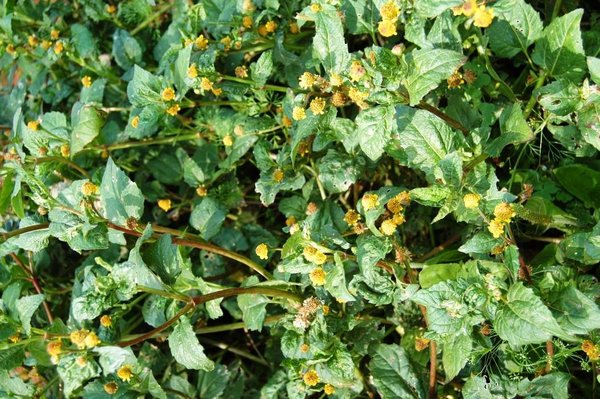




Jambu, the Female Aphrodisiac
see also the short story: http://www.recantodasletras.com.br/contos/4094237
Sandra Fayad
The plant is known also as the Agrião do Brazil, Agrião do Pará , Jambu-açu, Golden Button. This is the nickname of Agrião do Norte I feel more sympathy. Botanists classify this plant greenery of the Composite family, baptizing it with the scientific names of Spilanthes oleracea. However, I found publications that attribute to it the name of Spilanthes Acmella.
A very friendly, pretty, prefers born and grow in damp places and rich in organic matter. After flowering, can be confused with a common greenway of small yellow flowers countryside.
But just a clarification on the powers to ending in it constitution, so that the matter lay in the admired eyes open and are willing to prove the veracity of the information. It's very easy! Simply collect a small flowers and chewing it slowly. When contact with the saliva, its mild flavor of watercress goes first it anesthetizes the tongue and then the entire mouth.
In extract form, it constitutes a powerful resource to relieve toothache, sore throat, thrush. Its leaves also have powers digestive and high fevers, scurvy, cough, asthma, bronchitis properties and diseases of the urinary tract. From 2006, it constitutes the basis for an ointment to increase female arousal, as we shall later.
Old acquaintance of the Pará cuisine in dishes like duck in tucupi and tacacá, the Jambu is grown by small producers, mainly in the northeastern state, which is often used in cooking. Stimulates appetite and has diuretic effect and may lower blood pressure. In some countries, it is used to inhibit the bitter taste of some mixtures. It contains many nutritional properties, but is rich in cellulose, an important ingredient for the proper functioning of the intestine. Moreover, because of its strong flavor, is used as a condiment, it stimulates gastric secretion and aids in food digestion.
Today, besides the food, Jambu also generates business investment and earnings in other sectors such as the cosmetics industry, where soaps, anti-wrinkle creams, shampoos, sachets are produced.
After extensive research, it became a kind of natural botox (product that brands softens skin aging). The big news is the famous effect "treme-treme" from Jambu. So the women reported that they experienced a new product made of greenery-based, which promises attenuate unwanted wrinkles. According to one user 48, the effect is seen in the first weeks of use: "Everyone looks at me and says I have 25 years. I need to show my ID, for someone believes. You feel a freshness, as if the skin is clean "
Another user of 58 years, said she was with the fresher skin after passing the product. "she immediately feel the change. I have a little face of 46 year old "jokes.
In spite these innovations, researchers found that no public agency or research center of Pará has reliable information about the volume of Jambu which is produced in the state. According to technicians Embrapa, if counted, would generate many jobs and income for small farmers. This lack of statistical and proper planning is facilitating biopiracy (the appropriation of natural resources or traditional knowledge of communities without proper authorization). According to the SciFinder Scholar, an international database on the Internet by 2005, there were at least 34 patents Spilanthol (substance extracted from Jambu).
None of them was Brazilian.
According to the industrial pharmacist Wagner Luiz Barbosa, Phytochemistry Doctor of the University of Bohn, Germany, and coordinator of the master's degree in Pharmaceutical Sciences from the Federal University of Pará (UFPA), the Jambu is an example of wasted source of knowledge.
"We lost it for two reasons. First, a lack of policies directed toward applied research in plants and then because the overcontrol that affects researchers in Brazil is higher than what exist for biopirates. Here in Pará there is a "dead donkey" buried. You can not advance the discussions, "he criticizes.
"While this someone embarks on a Brazilian airport carrying four leaf of a plant, and sophisticated laboratories, make great discoveries," he continues.
The producer José Ribamar analyzes the situation: "The production of Jambu is big here in Pará may not have numbers on this, but I know it's big. Almost the same as the smell-green (there is no research on this greenery). The Jambu is very present in the Pará table and now with this news ... ".
Now emerges an unprecedented benefit to Jambu with the production of an ointment whose effect is to increase the female arousal. The product is the result of experiments conducted by Embrapa in partnership with the Center for Defense Black (Cedenpa), was tested on volunteers, with very good results. Produced by quilombolas communities Macapazinho Boa Vista and the Ita, both located in the municipality of Santa Isabel (PA), the product increases the peristaltic movements inside the vulva. "This is a sign that the male-dominated society is wrong to say that only the spermatozoon moves. In women it also happens "celebrates one of the project leaders.
The material for production of the ointment is grown for four years for those communities. The drug will be manufactured in medium scale, after the completion of a chemical laboratory in Macapazinho and promises great commercial success.
Much like watercress, although its leaves are smaller, thicker, harder and stronger flavor, Jambu is an indispensable ingredient in the preparation of "tacacá" and "duck in tucupi".
But attention! Must be consumed fresh and in good condition (lush leaves without insect bites or bruised). Case is to be kept for a few hours, let it soak in cold water.
See more in my book "Animais que plantam gente"
Você não pode copiar, exibir, distribuir, executar, criar obras derivadas nem fazer uso comercial desta obra sem a devida permissão do autor.





